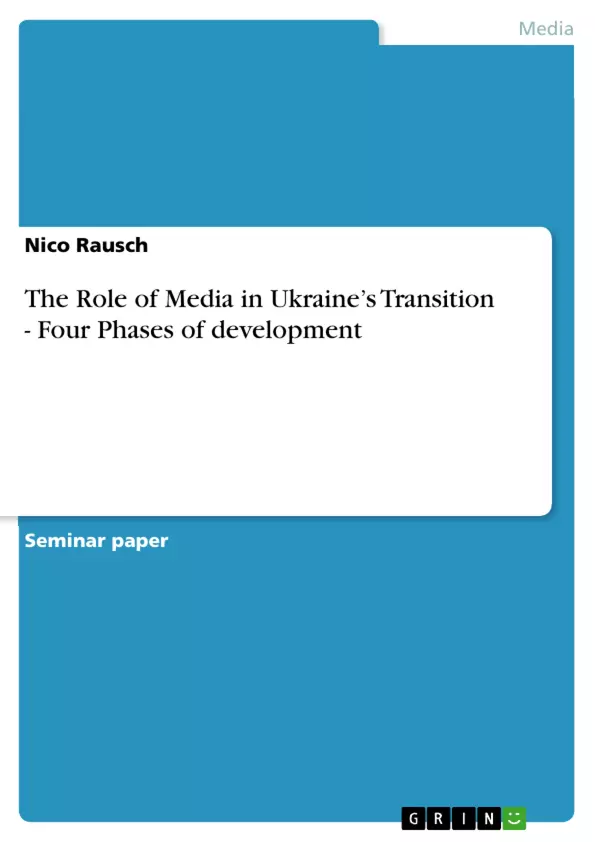This short but fresh analysis of media and its role in democratization will background the following paper about Ukraine’s media in democratization. As it will show, all above discussed factors matter in the Ukrainian case.
I will give a general overview about the development of media freedom in Ukraine. Therefore I will analyse various different indices:
Freedomhouse- Freedom of the Press
Freedomhouse- Nations in Transit/ Independent Media
Reporters Without Borders (RWB)- Country Ranking
IREX- Media Sustainability Index
These indices (except NIT) come to the same conclusions even if they use different approaches. Freedomhouse and RWB ratings are empirically quite similar (Becker et al. 2004) but critics about an overall American influence over Freedomhouse lead me to use both of them. There are more media freedom measurements but the above-mentioned correlate in their results and are broad enough to analyse the situation in Ukraine (ibid.). Additionally I will use the reports of these organisations and other scientific literature to explain the major changes. The questions, if media was beneficial for democratic change or not, will be crucial as well as if media does have affects (every time). I will describe the regime change (Orange Revolution) with the major focus on the media. Was it supportive or not? Did the media lead or follow?
I will describe the major outcomes for the media after the Orange Revolution and the future prospects on its role for democratization.
[...]
Inhaltsverzeichnis (Table of Contents)
- Introduction
- Development of Media Freedom in Ukraine
- Pre-Kuchma on the way to a hybrid model
- Kuchma's first term
- Late Kuchma period- one of the Ten Worst Enemies of the Press
- After the Orange Revolution
- Conclusion
- References
Zielsetzung und Themenschwerpunkte (Objectives and Key Themes)
This paper explores the role of media in Ukraine's transition to democracy, examining the evolution of media freedom within the context of different political regimes. The paper aims to analyze the impact of media on democratic development, particularly in relation to the Orange Revolution.- The evolution of media freedom in Ukraine under different political regimes.
- The influence of media on democratic transitions, particularly in Eastern and Central European countries.
- The role of media in the Orange Revolution and its aftermath.
- The analysis of various media freedom indices and their implications for Ukraine.
- The challenges and opportunities for media in consolidating democracy in Ukraine.
Zusammenfassung der Kapitel (Chapter Summaries)
- Introduction: This chapter provides an overview of the role of media in democratic transitions, highlighting the importance of civil society and a functioning public sphere. It also discusses the different ways media can influence democratization, both positively and negatively.
- Development of Media Freedom in Ukraine: This section examines the evolution of media freedom in Ukraine, analyzing the pre-Kuchma era, Kuchma's first term, the late Kuchma period, and the post-Orange Revolution era. The analysis uses various media freedom indices and reports from international organizations to assess the progress and challenges faced by media in Ukraine.
Schlüsselwörter (Keywords)
This paper focuses on the role of media in Ukraine's democratic transition, examining the development of media freedom, the impact of media on the Orange Revolution, and the challenges and opportunities for media in consolidating democracy. Key concepts include media freedom, democratic transition, civil society, public sphere, media indices, and the Orange Revolution.Frequently Asked Questions
What role did the media play in Ukraine's Orange Revolution?
The analysis examines whether the media led the democratic change or followed it, highlighting its crucial role in mobilizing civil society during the revolution.
How did media freedom develop under President Kuchma?
During the late Kuchma period, Ukraine was ranked as one of the worst environments for the press, characterized by significant state pressure and a lack of independence.
Which indices are used to measure media freedom in Ukraine?
The study analyzes data from Freedom House, Reporters Without Borders (RWB), and the IREX Media Sustainability Index.
What is the "hybrid model" of media?
It refers to the transitional phase where media systems exhibit characteristics of both state-controlled and independent models, often seen in post-Soviet transitions.
Did media freedom improve after the Orange Revolution?
The paper describes the major outcomes for the media following the revolution, assessing the progress made toward a functioning public sphere and independent journalism.
- Citar trabajo
- M.A. Nico Rausch (Autor), 2007, The Role of Media in Ukraine’s Transition - Four Phases of development, Múnich, GRIN Verlag, https://www.grin.com/document/115836



